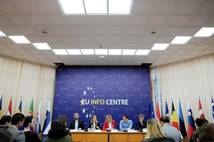You are here
Second round of workshops for ‘Balkan Futures’

From 27 February to 2 March 2018, the EUISS held the second round of workshops for the project ‘Balkan Futures’. The project is implemented by the EUISS and supported by the European Fund for the Balkans (EFB). It consists of a series of expert meetings/workshops in Sarajevo, Belgrade, Skopje, Tirana, and Brussels which bring together experts from the Western Balkan countries (Albania, Bosnia and Herzegovina, Kosovo*, the former Yugoslav Republic of Macedonia, Montenegro, and Serbia). The aim of the project is to provide a forum for in-depth discussions and analysis of regional trends, as well as reflect on the main drivers that will shape the Western Balkans by 2025, when the next enlargement phase is expected to occur. The project will result in a report elaborating different futures scenarios – desirable, probable, and least-probable – presenting the risks and opportunities of particular policy decisions.
The second round of four workshops was held in Skopje and Tirana from 27 February to 2 March at the premises of the EU Delegations in the former Yugoslav Republic of Macedonia and in Albania. During the workshops, the participating experts jointly discussed the possible scenarios for the future of the Western Balkans. On 2 March 2018, the EUISS also organised a public event entitled ‘The New EU Enlargement Strategy: Expectations and Realities’ at the EU Info Centre in Tirana. The panel of experts from different Balkan countries discussed both regional and country perspectives following the publication last month of the EU Commission’s Communication ‘A credible enlargement perspective for and enhanced EU engagement with the Western Balkans’. The event attracted significant media attention and gathered more than 50 participants – local and regional experts, diplomats, journalists, and representatives from state institutions and NGOs.
The next and final workshop of the Balkan Futures project will be held in the second half of April in Brussels. To remain informed about the project and related activities in the Western Balkans, use #balkanfutures on Twitter.